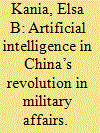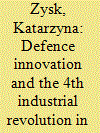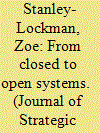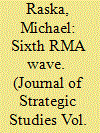|
|
|
Sort Order |
|
|
|
Items / Page
|
|
|
|
|
|
|
| Srl | Item |
| 1 |
ID:
179508


|
|
|
|
|
| Summary/Abstract |
This paper explores how Fourth Industrial Revolution (4IR) technologies obscure the traditional boundaries associated with the military realm. As the first examination of the conditions underlying the assimilation of 4IR technologies in Israel’s armed forces, this paper makes several contributions. It expands the knowledge on the military assimilation of 4IR technologies and describes the interaction between military doctrine and technology using current evidence. It also enriches the evolving discussion on the strategic effect of emerging technologies. Finally, it demonstrates how emerging technologies involve neither straightforward spinoff or spin-on processes but a reciprocal transfer of know-how between the military and civilian sectors.
|
|
|
|
|
|
|
|
|
|
|
|
|
|
|
|
| 2 |
ID:
179506


|
|
|
|
|
| Summary/Abstract |
The People’s Liberation Army (PLA) seeks not only to equal but also to overtake the US military through seizing the initiative in the ongoing Revolution in Military Affairs (RMA). Chinese military leaders believe the form of warfare is changing from today’s ‘informatised’ (信息化) warfare to future ‘intelligentised’ (智能化) warfare. The PLA’s approach to leveraging emerging technologies is likely to differ from parallel American initiatives because of its distinct strategic culture, organisational characteristics, and operational requirements. This research examines the evolution of the PLA’s strategic thinking and concepts of operations, seeking to contribute to the military innovation literature by evaluating major theoretical frameworks for the case of China.
|
|
|
|
|
|
|
|
|
|
|
|
|
|
|
|
| 3 |
ID:
179507


|
|
|
|
|
| Summary/Abstract |
Russia is pursuing select 4th Industrial Revolution (4IR) technologies in a drive to rapidly close the capability gaps with rivals. The transformation of warfare these technologies portend could also make Russia more vulnerable. Joining the ‘technological race’ seems therefore less of a choice than an existential necessity. Constrained by structural problems and lacking the resources of the US and China, however, Russia has so far struggled to leverage its ambitions within the 4IR. Yet it has also shown the ability to experiment with 4IR technologies, including hypersonics and AI, to amplify existing symmetric and asymmetric capabilities, and create interconnected systems that may provide critical advantages.
|
|
|
|
|
|
|
|
|
|
|
|
|
|
|
|
| 4 |
ID:
179505


|
|
|
|
|
| Summary/Abstract |
The return to strategic competition affects the US military services differently, but all are contending with the challenge of renewing their military advantage against near-peer, technologically advanced competitors. Commercially driven innovation trends simultaneously challenge the way that the US military manages technology. This article traces the pursuits to institutionalise open innovation practices inside the services to incorporate emerging technologies into their envisaged competitive advantage. Rather than treating the US military as a monolithic entity, this article assesses how new service-level organisations differ in the ways and means they pursue innovation and seeks to explain why those differences persist.
|
|
|
|
|
|
|
|
|
|
|
|
|
|
|
|
| 5 |
ID:
179510


|
|
|
|
|
| Summary/Abstract |
Fourth Industrial Revolution technologies and their applicability at sea now dominate debates about the future of naval operations. This article examines the extent to which such technologies, including autonomous and unmanned weapon systems and artificial intelligence, will disrupt naval warfare. Using two case studies, the South China Sea and the Baltic Sea, this article finds that in the key operational output of attaining sea control these technologies will not disrupt naval warfare. While they may intensify the competition between the operational attributes of detection, stealth, range and lethality, they will ultimately sustain existing understandings of seapower and its strategic effects.
|
|
|
|
|
|
|
|
|
|
|
|
|
|
|
|
| 6 |
ID:
179504


|
|
|
|
|
| Summary/Abstract |
The Revolution in Military Affairs, its concepts, processes, and debates, have evolved in five ‘IT-RMA waves’ since the 1980s. None of them, however, have fully achieved their intended outcomes as their ambitious premises have exceeded available technologies, budgetary resources, and operational capabilities of a given era. This paper argues that a new ‘artificial intelligence-driven RMA’ wave differs in the political, strategic, technological, and operational diffusion paths and patterns. While the AI-RMA may affect select countries and regions disproportionately, its technological advances coupled with an ongoing strategic competition is sufficiently broad to stipulate significant military changes across geopolitical lines.
|
|
|
|
|
|
|
|
|
|
|
|
|
|
|
|
| 7 |
ID:
179509


|
|
|
|
|
| Summary/Abstract |
Small states are often described as weak, and unlikely to achieve their goals when confronted by great powers. However, technologies of the 4th Industrial Revolution, especially autonomous weapon systems combined with artificial intelligence, may enable small states to enhance their security. Therefore, it should be rational for small states to develop strategies based on advances in technology. This article explores three small Scandinavian states – Denmark, Norway, and Sweden – in a comparative perspective of their capability and will to incorporate lethal autonomous weapon systems in their defence forces. Surprisingly, they reflect ambiguous adoption strategies and trajectories.
|
|
|
|
|
|
|
|
|
|
|
|
|
|
|
|
|
|
|
|
|